KINGDOM OF THE PLANET OF THE APES (2024)
Many years after the reign of Caesar, a young ape goes on a journey that will lead him to question everything he's been taught about the past...
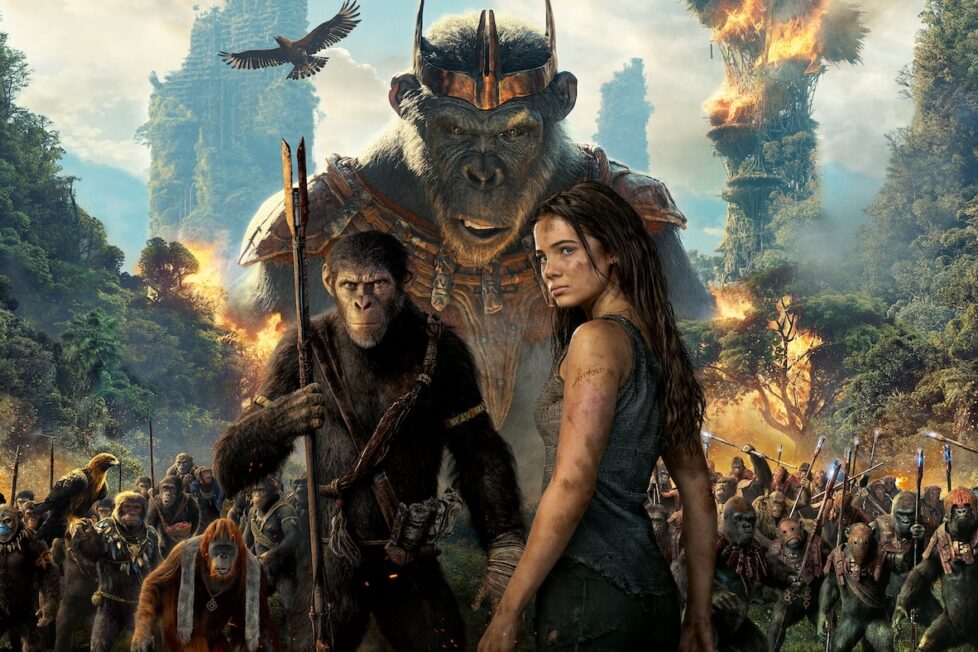
Many years after the reign of Caesar, a young ape goes on a journey that will lead him to question everything he's been taught about the past...


If you’d told me 12 years ago that the most thought-provoking, consistently good franchise films of the next decade would feature talking apes on horseback, I wouldn’t have believed you. Yet, here we are in 2024. While other major franchises are floundering in the shallows, Planet of the Apes has expertly overtaken them all, venturing into the deeper waters that writers and directors once loved to explore. Kingdom of the Planet of the Apes, like its predecessors Rise (2011), Dawn (2014), and War (2017), offers a beautifully filmed and acted exploration of societal power structures, the challenges of growing up in a complex world, and the joys and sorrows that come with being human (or, in this case, being an ape with human intelligence).
This newest addition to the franchise made popular by actor Andy Serkis is the first not to feature him in the starting role. Instead, this film takes place “many generations” after the main character of the first prequel trilogy, Caesar (Andy Serkis), has died. At the opening of the film, a brief glimpse of Caesar on a burial pyre as the apes around him mourn is our only sight of the first elder and leader of the apes. This beautifully realised and moving opening signals that we are entering a new phase for both the apes and the entire franchise.
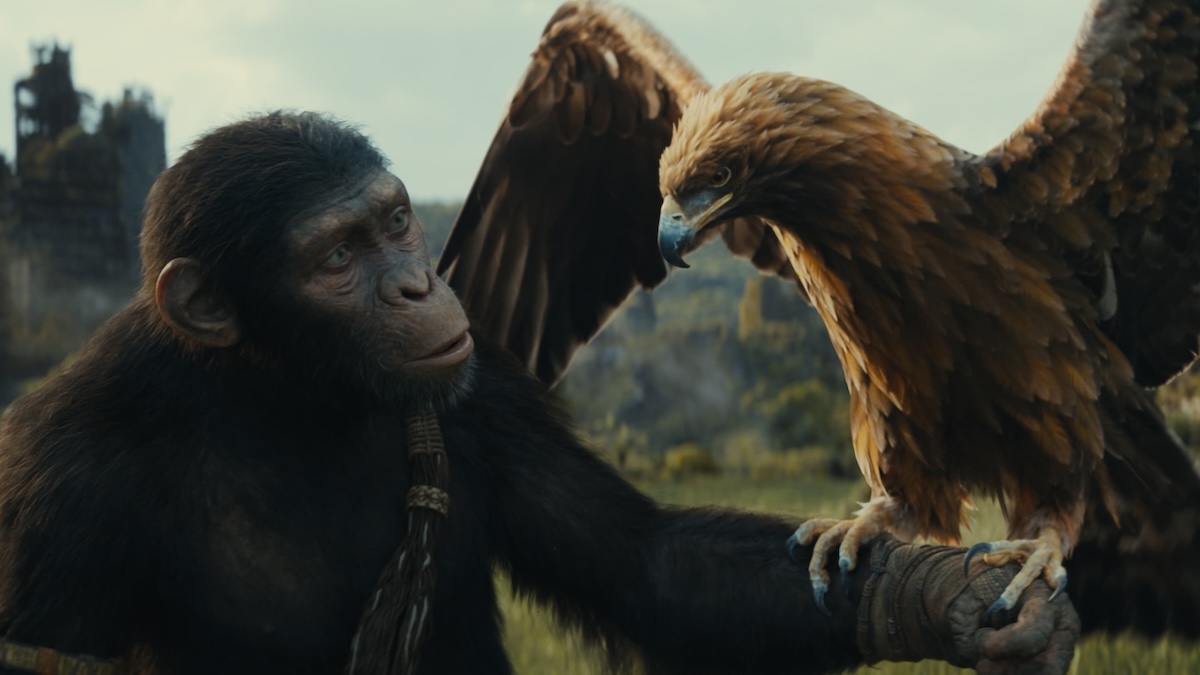
In this new phase, we follow a young ape named Noa. Noa belongs to a tribe of apes who find, raise, and train eagles. Noa is a young chimp who’s desperate to prove himself to his intimidating father, Kora, the leader of the Eagle clan. When Noa and his young friends, Soona (Lydia Peckham) and Aranya (Travis Jeffries), find evidence of what the clan calls “echos” (humans) in the woods near their village, news of the find reaches a nearby kingdom ruled by a tyrannical ape known as Proximo Caesar (Kevin Durand). When Proximo’s apes take Noa’s clan hostage, he embarks on a rescue mission, followed by a human named Nova (Freya Allan) who is more than she seems.
There’s a lot to unpack in this seemingly straightforward revenge/rescue story. Firstly, the idea of the apes breaking into separate groups and clans with their own cultures, traditions, and understanding of the world is fascinating. While Noa’s clan, for instance, have never heard of Caesar, Proximo has taken the ape leader’s name as his own. He also adopted a diminished view of Caesar’s words and teachings. Whereas Proximo focuses on Caesar’s strength (“Apes together, strong”), he ignores or discounts Caesar’s compassion for humans, mercy, and justice.
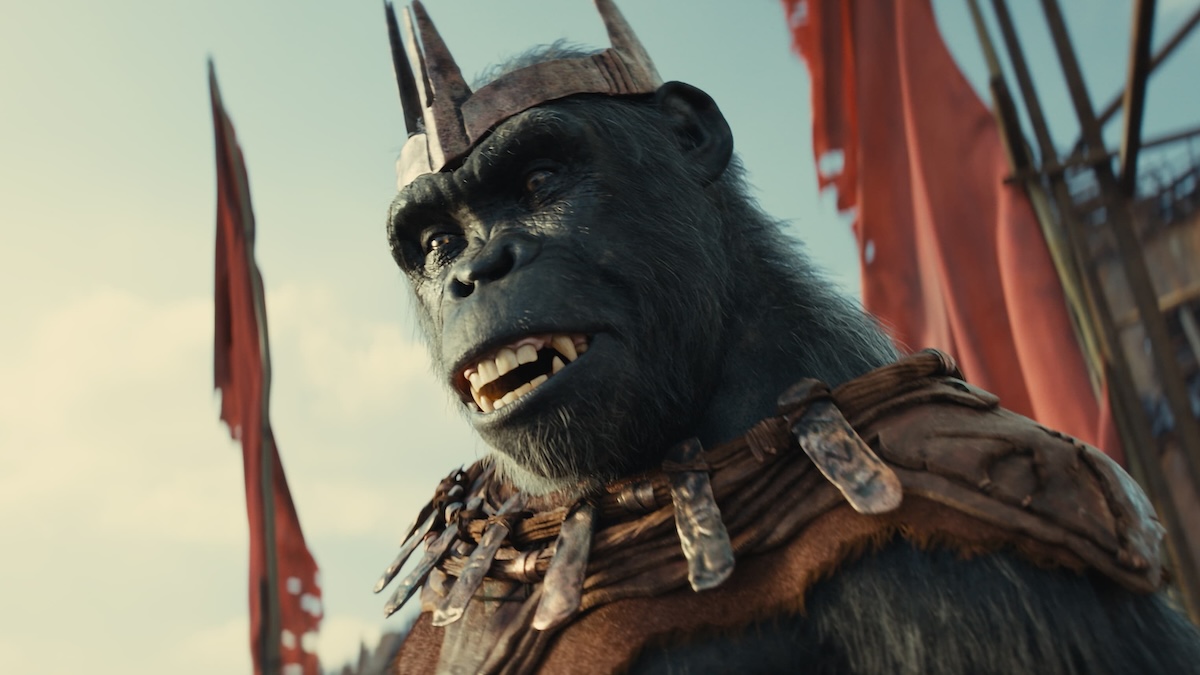
These qualities are kept alive in the ape world by the Order of Caesar. We learn about this hermit-like clan when Noa is assisted by Rakka (Peter Macon) on his mission.
The idea of lore and legends and even history being debated, argued and taken out of context is something that rings all too familiar to human history and today’s world. As these apes struggle to build a society, we see echoes of our own human history being played out for us compellingly and engagingly. Seeing both the best and worst of human traits come to full expression on the face of a chimp, allows us to take metaphysical questions seriously without leaving us void of hope. That’s a trick a lot of movies attempt but most fail at. Here, with the combination of beautiful film work, engaging performances, and brilliant writing, this blockbuster pulls it off.
Talking of beautiful film work, the world these apes inhabit continues to enthral us, just as it did in the previous films. With a mixture of pristine natural landscapes and overgrown human structures like lampposts and motorway flyovers, we are immersed in an environment that feels both real and fantastical at the same time.
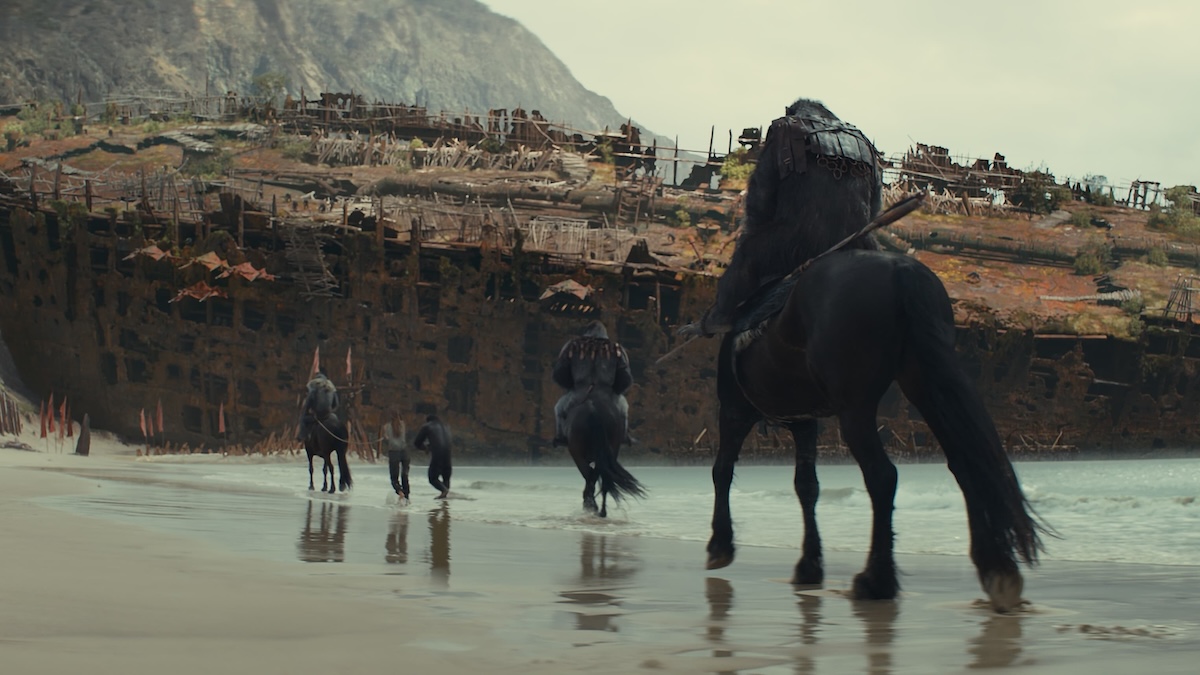
Performances by the ape actors are universally engaging. Owen Teague (The Stand), who was mentored by Andy Serkis for the role, delivers a very different character to Caesar. He’s certainly gentler than the first ape leader, but he’s also slower to trust and less naïve about the prospects of a perfect human/ape multicultural society. Peter Macon also gives a tender and often amusing performance as the ideal mentor.
As with other instalments, the film only falters when it tries to focus too closely on the humans. Humans attempting to get technology back up and running is a plot we’ve seen multiple times in these films. I was a little disappointed that they decided to tread the same ground here.
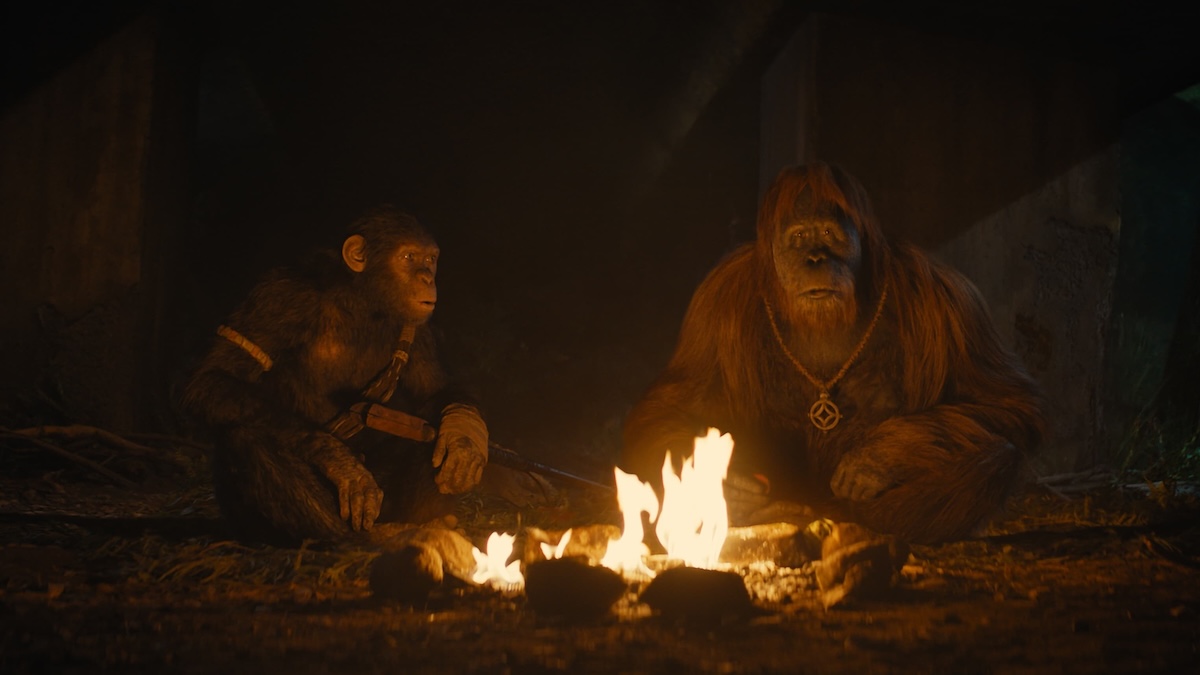
The human character called Trevathan (William H. Macy), a sycophantic yes-man for Proximo, has little bearing on the plot and seems almost as if he were shoehorned in to allow audiences to recognise a name in the credits. Meanwhile, Freya Allan’s largely one-note performance makes her far less compelling or relatable than her ape counterparts. Perhaps this is why, at the film’s end, when the audience is supposed to be conflicted about who to root for in the inevitable upcoming conflict, I found myself firmly rooting for the apes. Tighter pacing could have addressed this. Cutting the film by around 20 minutes wouldn’t have harmed it and could have possibly strengthened its impact.
However, these are small, almost nitpicky problems in what is, overall, the most exciting, beautiful, and thought-provoking film I’ve seen this year. Leaving the theatre, I was very tempted to buy another ticket and immediately go see it again. When a movie can make you do that, you know it’s done its job.
USA | 2024 | 145 MINUTES | 2.39:1 | COLOUR | ENGLISH

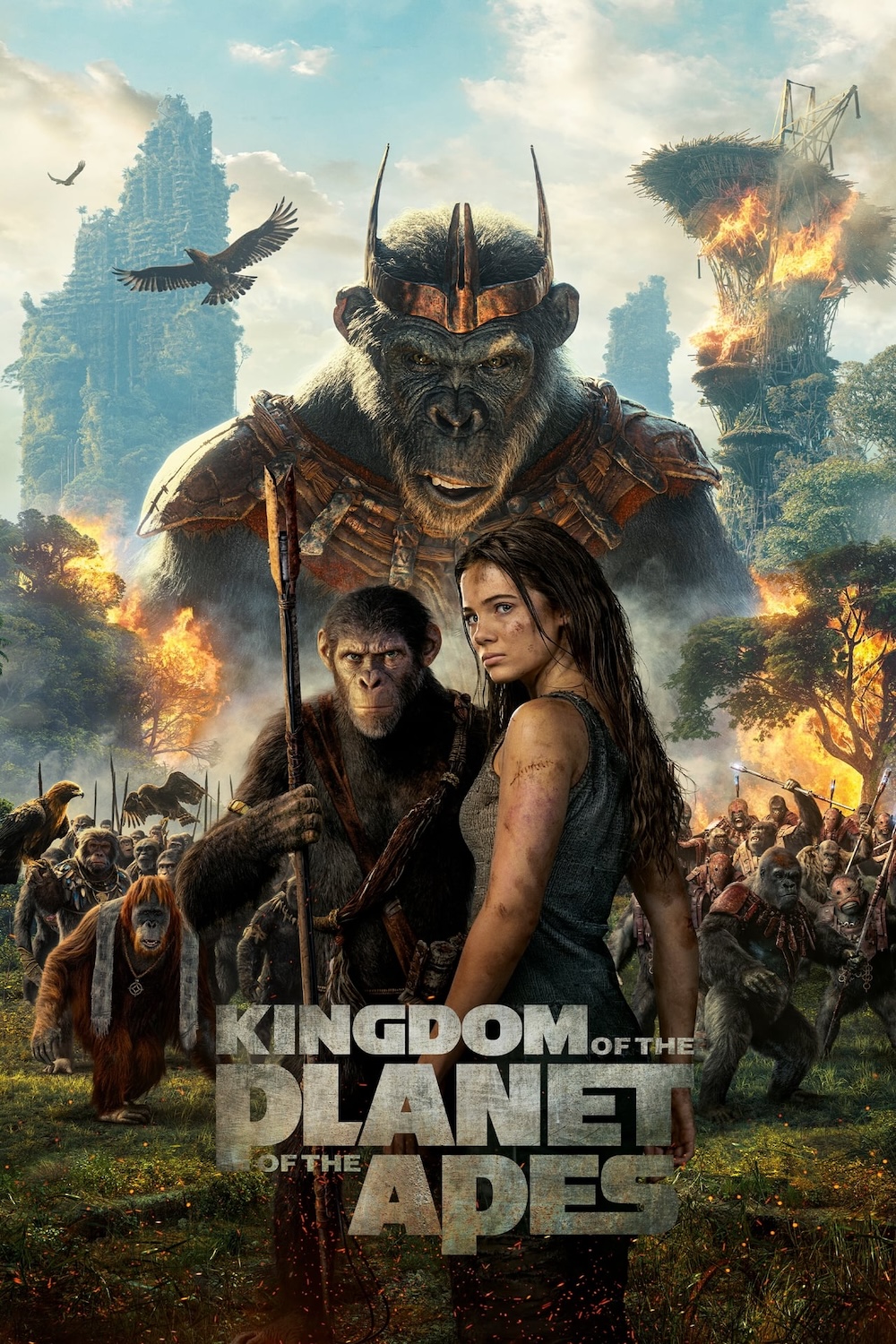
director: Wes Ball.
writer: Josh Friedman (based on characters created by Rick Jaffa & Amanda Silver, and the premise of ‘Planet of the Apes’ by Pierre Boulle).
starring: Owen Teague, Freya Allan, Kevin Durand, Peter Macon, William H. Macy, Sara Wiseman, Neil Sandilands, Eka Darville, Ras-Samuel & Dichen Lachman.
